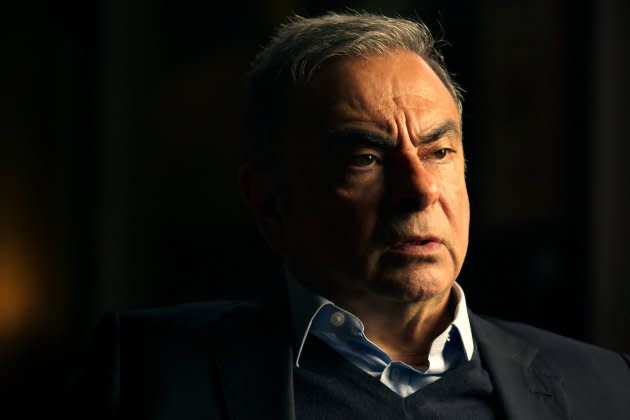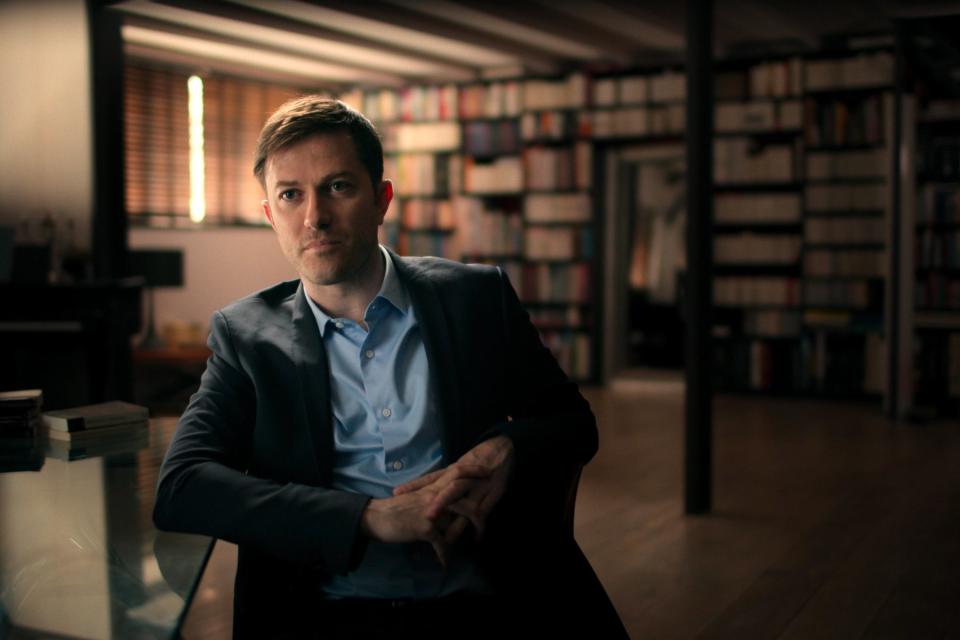The Fugitive Nissan CEO Smuggled Out of Japan in a Music Box
- Oops!Something went wrong.Please try again later.

The marriage of elite journalism and documentary has been a welcome one, for reasons that should be clear. Get experienced, polished reporters involved in a story and you’re generally going to get a tale not only well-told but responsibly told, with due diligence taking precedence over flash and sensation. Add top filmmaking talent to the mix and you get the best of both worlds. The New York Times has been knocking it out of the park with its FX New York Times Presents series. Now The Wall Street Journal (in collaboration with Box to Box) has stepped up with a killer four-part docuseries, Wanted: The Escape of Carlos Ghosn, streaming on Apple TV+. Gripping and, yes, deeply reported, often in real time, Wanted is a gripping take on a wild story that provides generous helpings of rich context, a necessary if sometimes overlooked ingredient in nonfiction filmmaking.
This is a story you might know in outline, or even in detail if you happen to be a news junkie (and here we provide an early spoiler alert, even though most of the specifics of the Ghosn saga are widely available elsewhere). Ghosn, born in Brazil to Lebanese parents, educated in Paris, was a worldly automotive tycoon with a reputation for turning around corporations in peril, often by slashing thousands of jobs at a time (French media dubbed him “Le cost cutter”). In 1996, he resuscitated the fortunes of gasping Renault. Then, in 1999, Renault bought a 37 percent stake in flailing Nissan, where Ghosn performed similar economic miracles and became a cultural hero in Japan.
More from Rolling Stone
Suspect Identified in Killing of Store Owner Over Pride Flag
Miguel Bosé's Stolen Vehicle Recovered After Alleged Armed Attack in Mexico City
Prince Andrew's Jeffrey Epstein Ties Explored in 'Secrets of Prince Andrew'
Sitting before director James Jones’ cameras, and in voluminous archive footage, Ghosn comes across as a narrow-eyed shark, swimming toward the inevitable blood of his next corporate conquest. He lived a lavish lifestyle, throwing himself extravagant parties (including a Louis XIV soiree in Versailles) and jetting around the world with his family, all in the name of the “alliance” between Renault and Nissan. Then, things get weird. Ghosn is arrested in Japan amidst talks of a merger between the two companies, charged with a variety of financial crimes and thrown into solitary confinement in what looks like a palace coup out of Shakespeare. Nissan’s HR honcho, Greg Kelly, is lured to Tokyo, where he is also put behind bars. (If Wanted makes anything clear it is this: You do not want to get arrested in Japan).
And then, things get even weirder. Ghosn and his wife, Carole, enlist the help of a high school football coach and former Green Beret, Michael Taylor, to smuggle Ghosn, on house arrest, out of Japan and into Lebanon, in a plot involving musical equipment cases and a private plane. It turns out Wanted isn’t just an investigation; it’s also a caper, depicted in reenactments that boast the editing and cinematography chops of an Ocean’s Eleven movie. The series has its cake and eats it, too, blending high-stakes, shoe-leather reporting with thriller sizzle.

Meanwhile, the true heroes are – drumroll, please – the journalists, chiefly WSJ’s Sean McLain and Nick Kostov, chasing down the leads and leaks and data dumps that make the story possible. Wanted doesn’t have the drama or fire of narrative features like All the President’s Men or Spotlight, but it is still very much about reporters at work (including some rather humorous reenactments: OK, sit at the bar, take a drink, look at your cell phone, and appear pensive as the perfect lighting caresses your face). And yet, Wanted also showcases the differences, not all of them flattering, between creating a dramatic narrative for the camera and reporting a story for the public interest. For instance, Taylor, the special ops man, is initially presented as a sort of tough-guy everyman superhero. Only later do we learn he is also an ex-convict who seems to have done some strongarm bilking of his own. This is the kind of information that would sit near the top of a news story; here it’s used for suspense and misdirection, if not deception. The newspaper/documentary marriage isn’t always perfect.
As Wanted sends us through the looking glass, and then pulls us back out for its final act, it emerges as an “and” story, not an “or” story. Yes, the Japanese criminal justice system is frightening, especially when backed by the nation’s Old Boys of industry. And: Ghosn seems to have engaged in considerable financial malfeasance, representing extreme conflicts of interest and perhaps even crimes. Once France issues its own arrest warrant for Ghosn, currently still hiding in Lebanon, his pure victim act becomes far less feasible. In other words, this is a story still in progress, and part of the series’ thrill is the sensation of tagging along for the ride. This, too, is what great journalism does. It brings you up to speed and makes you hungry to see what happens next.
Best of Rolling Stone

